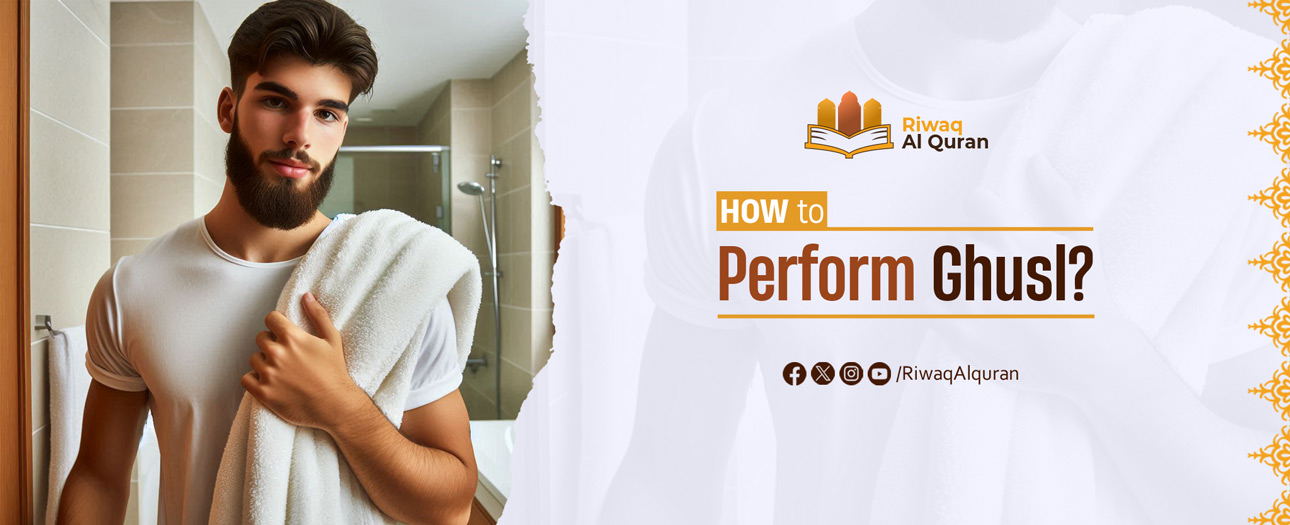Ghusl is a full-body purification in Islam, performed after events like menstruation or sexual relations. To do it, set the intention, say “Bismillah,” wash hands, perform Wudu, and then pour water over your head and body. Ensure water reaches all parts, including the roots of the hair. Women must untie braids after menstruation but not after Janabat.
Ghusl is a form of ablution (Tahara) that involves washing the entire body with the intention of achieving the state of Tahara. It is not just a regular bath but includes specific steps.
In this article, we will explain: How to perform Ghusl for males and females, how to perform Ghusl from Janabat, and what situations require Ghusl.
Performing Ghusl is a significant act of worship that brings big blessings and closeness to Allah. It is mentioned in the Quran:
(إِنَّ ٱللَّهَ يُحِبُّ ٱلتَّوَّٰبِينَ وَيُحِبُّ ٱلْمُتَطَهِّرِينَ)
“Surely Allah loves those who always turn to Him in repentance and those who purify themselves.“
[Al-Baqarah – 222]
Let’s dive into more interesting details about Ghusl!
Table of Contents
What is Ghusl?
Ghusl is the complete washing of the body with water, from head to toe, as an act of purification in Islam. While it is similar to taking a shower, Ghusl follows specific steps, which we will explain in this article.
During Ghusl, only water is used, without the need for soap or other cleaning agents.
Ghusl is a command from Allah (SWT) for Muslims to achieve a state of Tahara (purity). It purifies both the body and soul, allowing a Muslim to perform acts of worship such as Salah, Hajj, and other obligatory practices.
Read more about Benefits of Taharah and Its Importance In Islam
Types of Ghusl
Ghusl, the full-body purification, is required in various situations in Islam. There are two primary types of Ghusl:
- Obligatory Ghusl (Ghusl Wajib): This is required in cases of major impurity (Hadath Akbar), including after:
- Sexual intercourse (Janabah)
- Menstruation (Hayd)
- Postpartum bleeding (Nifas)
- Death (Ghusl for the deceased)
- Non-obligatory Ghusl (Ghusl Mustahabb): This is recommended but not compulsory in situations such as:
- Before the Friday (Jumu’ah) prayer
- Before Eid prayers
- After Hajj or Umrah
- After a person wakes up from sleep with a wet dream
Each type involves washing the entire body with the intention (niyyah) of purification, but the obligation and the reasons for performing Ghusl differ.


How To Perform Complete Ghusl?
The complete form of Ghusl involves following the exact method practiced by Prophet Muhammad (Peace be upon him). This includes performing the obligatory steps of Ghusl, along with additional Sunnah actions that are highly recommended but not compulsory.
Here are all of the required steps :
1. Setting Your Intention for Ghusl ( Niyyah ) :
Before beginning Ghusl, you must make the intention (Niyyah) in your heart to purify your body and soul from the state of impurity. For example, if you are performing Ghusl due to Janabat, you should specifically intend that this Ghusl is for purification from Janabat.
2. Start the Ghusl With Saying, Bismillah.
It is better to start all acts in Islam by the Basmalah, To have the blessings of Allah on every act you are doing.
3. Washing The Hands in Ghusl
In the sequence of Ghusl, it is important to wash your hands first, Preferably three times using only water.
Note that during Ghusl, only water should be used for purification, as it is pure (Taher). While soap or body wash can be used during a regular shower, they should not be part of the Ghusl process.
4. Performing Wudu after Ghusl
Performing Wudu is a preferable (Mustahab) step during the process of the complete form of Ghusl.
For more details about Wudu, Read more here: How to Perform Wudu?
5. Washing the Head To Hair Roots in Ghusl
In this step of Ghusl, pour water over your head three times. It is essential to use your fingertips to ensure the water reaches your hair roots. Make sure the water flows through your hair and beard, covering every part thoroughly.
6. Ghusl by Pouring Water Over The Rest Of Your Body
In this step, begin by pouring water over the right side of your body three times, then repeat the same process on the left side. While doing this, It is Sunnah to rub your body with your hands to ensure the water reaches every part of your body.
Ghusl in Sunnah:
The complete Ghusl is based on the teachings and practices of the Prophet Muhammad (Peace be upon him), which were narrated by Aisha, the mother of the believers (may Allah be pleased with her). These practices provide us with clear guidance on how to perform Ghusl properly according to Sunnah.
`Aisha ( may Allah be pleased with her ) said, “Whenever Allah’s Messenger ( Peace be upon him ) took the bath of Janaba, he cleaned his hands and performed ablution like that for prayer and then took a bath and rubbed his hair, till he felt that the whole skin of the head had become wet, then he would pour water thrice and wash the rest of the body.”
Read more about Types of Tahara in Islam and How to Correctly Perform it
When is Ghusl Required?
There are specific situations where Ghusl is required, and these are recognized by all Islamic schools of thought. These include:
- Ghusl Al-Janabat: A state of major ritual impurity, Caused by sexual intercourse or wet dreams
- The Ghusl after Menstrual Cycle ( Hayd – الحيض )
- The Ghusl after Giving birth, After postpartum bleeding has stopped. ( Nifas – النفاس )
- The Ghusl after death (Ghusl Al Mayyet – غسل الميت)
- Doing ghusl for Jumu`ah (Sunnah)
- The Ghusl for Eid (Sunnah)
- The Ghusl after converting to Islam
Now let’s dive deep into how to perform Ghusl after each of these kinds of situations.
Read more about: Does Ghusl Count As Wudu?
How To Perform Ghusl For Female After Period?
After a woman’s period ends, she must perform Ghusl before resuming Salah, Sawm, or touching the Mushaf. Women are exempt from these acts during their menstrual cycle as a mercy from Allah.
Once the period ends, the woman should ensure it has completely finished. She can then perform either the complete form or the acceptable form of Ghusl.
To perform Ghusl for females, begin by making the intention (niyyah) in your heart for purification. Start with saying “Bismillah” and then wash your hands three times. Afterward, perform Wudu as a recommended step, followed by pouring water over your head three times, ensuring it reaches the roots of your hair.
Then, pour water over the right side of your body three times, followed by the left side, rubbing your body to ensure the water reaches every part. This process ensures complete purification, following the practice of the Prophet Muhammad (Peace be upon him).
It is recommended that she perform the complete Ghusl and untie her braids as she must wash her entire body, including her hair, ensuring water reaches the roots.
Learn all about that and more by checking the following article : Wudu Steps For Women – How To Perform Wudu For Females?
Using Musk or Perfume for Tahara after Period for Female
It is Sunnah to use Musk Tahara after the period ends to remove the smell of blood from women’s body
‘A’isha said that a woman of the Ansar asked the Prophet about washing after menstruation and he instructed her how to do it, saying,
“Take a piece of cotton with musk and purify yourself with it.” She asked how she should do this, and he replied, “ Purify yourself with it. ”
She asked again how she should do this and he replied, “Praise be to God! Purify yourself with it. ” ‘A’isha then drew her aside and said, “ Go over the mark of the blood with it. ”
When Ghusl is Required for Women
Women are required to perform Ghusl after the following situations:
- Ghusl Al-Janabat: A state of major ritual impurity, Caused by sexual intercourse or wet dreams
- The Ghusl after Menstrual Cycle ( Hayd – الحيض )
- The Ghusl after Giving birth, After postpartum bleeding has stopped. ( Nifas – النفاس )
Interested to learn more about Islamic studies for women? You could learn from our Best Female Quran Teachers Online.
Experience Riwaq Al Quran Classes
Watch real moments from our live sessions at Riwaq Al Quran and see how we bring learning to life. These clips highlight our interactive, student-focused approach designed to keep learners engaged, motivated, and actively involved in every step of their educational journey.
How to Perform Ghusl from Janabat
Performing Ghusl after Janabat is usually done by washing your entire body with water especially your private parts making sure to remove any remaining things on your body from Janabat, Also washing your head and your hair through the roots is essential.
For women: It is not essential to untie your hair braids in the Ghusl from Janabat
Janabat Ghusl in Quran
Janabat Ghusl is a direct order from Allah, It was mentioned in several Ayat.
“ يَا أَيُّهَا الَّذِينَ آمَنُوا إِذَا قُمْتُمْ إِلَى الصَّلَاةِ فَاغْسِلُوا وُجُوهَكُمْ وَأَيْدِيَكُمْ إِلَى الْمَرَافِقِ وَامْسَحُوا بِرُءُوسِكُمْ وَأَرْجُلَكُمْ إِلَى الْكَعْبَيْنِ ۚ وَإِن كُنتُمْ جُنُبًا فَاطَّهَّرُوا ۚ “
” O believers! When you rise up for prayer, wash your faces and your hands up to the elbows, wipe your heads, and wash your feet to the ankles. And if you are in a state of ˹full˺ impurity, then take a full bath. “
[ Al-Ma’idah – 6 ]
How to Make Ghusl in The Shower?
To make Ghusl while taking a shower you need to set your intention first that you are performing Ghusl. And then you need to wash your whole body with only water and make sure that water reaches every inch of your body. Then, feel free to start your shower with the soap and shampoo as you wish.
You can take a shower first and then perform the Ghusl after the shower. It is up to you but again, It is important not to mix between the two processes.
Can You Do Ghusl without a Shower?
Yes! Taking a shower with soap and shampoo, etc., is not something obligatory for completing the Ghusl, It is actually irrelevant in that case.
But of course, it is part of good hygiene to take a shower and to use specific products that are designed specifically to clean your body
Can You Do Ghusl without Washing Your Hair?
No, because washing your hair during Ghusl is required, but the opinion differs between Islamic schools of thought.
Al-Shafi’i Madhhab: It is obligatory to wash every inch of your hair because it is considered part of the body, as per the Hadith: “Under every hair, there is the state of impurity.”
Madhhab of Imam Abu Haneefah: It is enough to pour water over your head three times, ensuring it reaches the roots of the hair. There is no obligation to wash the entire hair.
For Women: All Madhhabs agree that no need for women to untie their hair braids during Ghusl from Janabah, But when it comes to Ghusl from Period it is a must to untie the hair braids.
Both opinions are valid, and you can follow the view that aligns with your belief. Either way, your Ghusl will be complete.
Du’a after Ghusl
We say Du’a in Ghusl the same as we say in Du’a in Wudu. And for sure the best of Du’a is what Prophet Mohammed ( Peace be upon him ) said :
وَعَنْ عُمَرَ بْنِ الْخَطَّابِ رَضِيَ اللَّهُ عَنْهُ قَالَ: قَالَ رَسُولُ اللَّهِ صَلَّى اللَّهُ عَلَيْهِ وَسَلَّمَ: “ مَنْ تَوَضَّأَ فَأَحْسَنَ الْوُضُوءَ ثُمَّ قَالَ أَشْهَدُ أَنْ لاَ إِلَهَ إِلاَّ اللَّهُ وَحْدَهُ لاَ شَرِيكَ لَهُ وَأَشْهَدُ أَنَّ مُحَمَّدًا عَبْدُهُ وَرَسُولُهُ اللَّهُمَّ اجْعَلْنِي مِنَ التَّوَّابِينَ وَاجْعَلْنِي مِنَ الْمُتَطَهِّرِينَ، فُتِحَتْ لَهُ ثَمَانِيَةُ أَبْوَابِ الْجَنَّةِ يَدْخُلُ مِنْ أَيِّهَا شَاءَ “
Umar bin Al-Khattab narrated that :
Allah’s Messenger ( Peace be upon him ) said: ‘ Whoever performs Wudu, making Wudu well, then says: (Ashhadu an la ilaha illallah, wahdahu la sharika lahu, wa ashhadu anna Muhammadan-abduhu wa rasuluhu, Allahummajalni minat tawwabin, waj’alni minal mutatahhirin) ‘I testify that none has the right to be worshipped but Allah Alone, there are no partners for Him. And I testify that Muhammad is His servant and Messenger. O Allah! Make me among the repentant, and make me among those who purify themselves.’ Then eight gates of Paradise are opened for him, that may enter by whichever of them wishes.”
Benefits of Sleeping in a State of Tahara:
It is a Sunnah to perform Ghusl before sleeping, as Prophet Muhammad (peace be upon him) never slept without being in a state of purity.
Sleeping in a state of Tahara has numerous benefits, as highlighted in the Sunnah, which will bring you blessings from Allah (Subhanahu wa ta’ala).
The Prophet Muhammad (peace be upon him) said: “There is no person who goes to bed in a state of purity, then wakes up during the night and remembers Allah, asking Him for good in this world and the Hereafter, except that Allah will grant him what he asked for.“


Why Students Love Learning with Riwaq Al Quran
Hear directly from our students about how Riwaq Al Quran Academy has transformed their connection with the Book of Allah. Their experiences reflect the dedication, care, and quality that guide every step of our teaching.
Riwaq Al Quran Is Your Choice to Learn All About Fiqh
Riwaq Al Quran is a leading online platform that offers the best personalized learning experience. Our approach brings together skilled teachers and knowledgeable scholars, along with customized learning plans to provide a personal and meaningful educational experience for each student.
What makes Riwaq Al Quran your choice is that our curriculum helps both children and adults on their spiritual and educational journeys. You can learn at your own pace online, guided by experienced native instructors who are here to support you in achieving your goals in Quranic and Islamic education.
We offer several courses such as:
- Online courses for kids.
- Online Quran classes for kids and adults.
- Online Arabic courses
- Online Ijazah courses
- Online Islamic Studies courses.
Here are a sample of our set of Quran Courses that will be helpful for you:
- Online Tafseer Course: Delve into Quranic meanings with our insightful online Tafseer course.
- Noorani Qaida Online: Learn Quranic basics efficiently through our Noorani Qaida online program.
- Online Quran Recitation Course: Enhance Quranic recitation skills through our expert-led online course.
- Online Tajweed Classes: Master Tajweed rules for beautiful Quranic recitation in online classes.
- Quran Memorization Online Course: Memorize the Quran effectively with our specialized online memorization course.
- Online Qirat Course: Explore diverse Qirat styles with our comprehensive online Qirat course.
- Online Quran Classes for Kids: Nurture a love for the Quran in kids through interactive online classes.
Explore our courses now and join any of them to enjoy our two free trials!
Conclusion:
Ghusl is a comprehensive body purification ritual in Islam, requiring the full washing of the body with water to achieve purity (Tahara) before engaging in acts of worship such as Salah or Hajj. It differs from a regular shower in that it involves a precise set of steps, including making the intention (niyyah) for purification, saying “Bismillah,” and washing specific body parts in a defined order.
There are two main types of Ghusl: obligatory (Wajib), such as after sexual intercourse, menstruation, or death, and non-obligatory (Mustahabb), which is recommended for acts like Jumu’ah or Eid prayers. It is also essential to wash the hair thoroughly, ensuring water reaches the roots.
To perform Ghusl, begin with the intention of purification, followed by saying “Bismillah.” After washing the hands, perform Wudu, then pour water over the head and body, starting from the right side, followed by the left, ensuring that every part of the body is washed.
While Ghusl can be done in a shower, it is crucial not to mix it with regular washing. Women should untie their braids during Ghusl after menstruation, but not after Janabat. The process ensures complete physical and spiritual purification, with the ultimate goal of being in a state of purity before Allah.


































